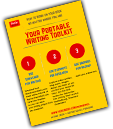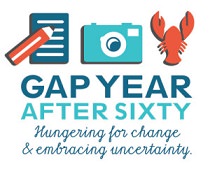Lessons on writing that sucks: from Pam Slim and Betsy Rapoport’s workshop in the red rocks of Sedona
 I attended my first writing workshop recently. The red rocks of Sedona were a magnificent setting. The attendees were thoughtful and smart. And the workshop leaders were a perfect blend of inspiring and practical. It added up to a magical weekend whose effects linger still. Oh, and there was a lot of swearing which, somehow, was very helpful.
I attended my first writing workshop recently. The red rocks of Sedona were a magnificent setting. The attendees were thoughtful and smart. And the workshop leaders were a perfect blend of inspiring and practical. It added up to a magical weekend whose effects linger still. Oh, and there was a lot of swearing which, somehow, was very helpful.
The participants were a group of about 15 women of all ages – and one brave man, who is in the military, a lawyer, a triathlete and hugely creative. Although few of them were professional writers, all wrote with clarity and passion. We read aloud after each freewriting session and I was struck over and over by the power of their words.
And then there were our teachers: Pamela Slim of Escape From Cubicle Nation fame, the wisest, warmest and most practical person I know. She is a speaker and business coach for entrepreneurs and is working on a new book, Body of Work.
See my recent interview with Pam.
And Betsy Rapoport, a veteran book editor who was previously executive editor at Random House and has edited or worked with numerous New York Times bestselling authors including Martha Beck and Pulitzer Prize winner Lucinda Franks. She is also a published author herself. She is funny and irreverent. In fact, she is deliciously profane.
In truth, I didn’t know what to expect. Although I’ve been a professional writer for decades, first as a journalist and then as author of The Corporate Blogging Book, I had never been to a writing retreat. And even though I am a book coach to business writers, I believe in what yogis call beginner’s mind.
Takeaways from the workshop
I came away with big ideas, practical tips, positive energy, clarity and so much more. In the spirit of generosity that we cultivated at the workshop, I’d like to share some takeaways with you. I hope you find them useful. It’s useful for me to write them down.
First, I returned with a feeling of calm and purpose about my writing. I have been working on a new book and haven’t made much progress, nor do I like what I’ve written so far.
The biggest takeaway? Suckiness is good. As Betsy put it, “Have I convinced you that it’s good to be bad?”
Anne Lamott famously exhorts us in Bird by Bird to write a “shitty first draft.” Betsy believes in shitty fifth and shitty tenth drafts. And told us stories of best-selling authors she’s worked with who revised and rewrote their manuscripts multiple times.
Writers write, as Betsy pointed out.
And if you write every day, without judgment, you can be sure that most of what you write will suck. And that is OK. In fact, it’s good.
“There’s gotta be a pony in here somewhere”
To illustrate, Betsy told us a version of an old joke: a man comes along and notices a boy who has climbed to the top of a pile of horse shit. The boy is digging down like a maniac. Finally, the man asks, “What are you doing?” And the boy replies, “With all this shit, there’s gotta be a pony in here somewhere.”
[Interestingly, this joke is said to have been Ronald Reagan’s favorite.]
I won’t get into all the details but I will tell you that there was a lot of profanity in our group. FFS (for f*ck sake) was a favorite. And yes, we called it horse shit and not manure. There’s something about writing – the doing of it and the talking about it – that prompts a lot of cussing.
This blog post sucks and that’s OK
I am staring at the pile of notes I took to see what leaps out. And reminding myself that this blog post is supposed to be crappy. Heck, this is only my third draft. Sorry Betsy, I couldn’t get to five drafts although I did take out a lot of stuff. Here are some nuggets in no particular order:
Challenge your assumptions about writing
Do you need to be in an environment that is perfectly quiet? Does your desk need to be in perfect order? And the chief obstacle: you don’t have enough time so why start writing.
Turn it around, Betsy advised us. Distraction is perfect. A limited amount of time is good. What’s wrong with five or 15 minutes? It makes you focus.
Do you have a big idea for a short book?
Registration for the March 7, 2013 – May 2, 2013 session of Beta Author Boost is closed. You can watch the replay of my free webinar: Knock Down the Three Stumbling Blocks Preventing You From Writing a Short Book.
Develop a writing practice
 The most important thing, in addition to challenging the voice that says you’re not good enough and that your writing is crappy, is to develop a writing practice.
The most important thing, in addition to challenging the voice that says you’re not good enough and that your writing is crappy, is to develop a writing practice.
This means:
– Butt-in-the-seat time. Writers write.
– Write every day even if it’s for five minutes. You can do that, right?
– Give yourself permission to write crappy drafts, FFS. Allow was our word for Day 1 of the workshop.
– Non butt-in-the-seat time can count as writing time. I knew this intuitively but how seductive to hear it from Betsy. Walking outside or on the treadmill at the gym – in other words, repetitive motion – unlocks ideas. We challenged ourselves to come up with creative ways of writing when you’re not writing.
[Update: I’m joking. Ultimately, it doesn’t really count as writing unless you’re, um, writing.]
– Be patient with yourself. Don’t rush. If your mind is blank, wait. The ideas and words will come.
– Assemble a few writing totems: a special stone, a candle, a pen. My new writing stone is the purple amethyst in the photo above. The candle is rosemary eucalyptus.
After fondling Pam Slim’s writing crystal, a group of us made a dash for the Sedona Crystal Vortex shop to find just the right totem. This all made perfect sense in Sedona but heck, it’s still comforting back in DC.
Ask yourself: how do I want to change my reader?
Ask yourself how you want your beloved reader to be changed by what you’ve written. Yes, we used phrases like “beloved” a lot. Again, this made perfect sense in Sedona.
What story are you telling yourself about your writing (whether it’s a blog post or a book)? Is your voice saying, “I shouldn’t be writing this… I’m not worthy or good enough”? Turn that around and think about how you can be of service to your reader. Pam says she is doing that a lot as she sprints to finish Body of Work.
An accountability partner
We were introduced to a nifty idea: find an accountability partner to help you plant your flag and commit to a daily writing practice. Choose someone whom you respect. If he or she is doing their daily writing, it puts pressure on you to do yours.
I asked one of the participants if she would do this with me. We are emailing each other every day with a word count in the subject line. That’s all. Her email says 1097. Mine says 534. No judgment. No explanation. It’s the daily doing of it that counts.
Remember when you loved to write
Remember back to the time you felt exhilarated about writing. Was it second grade or was it fifth grade? You loved to write, you had no guilt or shame, you felt supremely confident. Recapture that feeling.
Be your own sherpa. Have faith that you can pull yourself forward one step at a time and resist the judgment of others.
[Top photo taken with my iPhone on our silent walk through the sandstone cliffs.]
Does your writing suck? I invite you to join me for a free webinar on Tuesday Feb. 26, 2013 at 2:00 PM Eastern to Knock Down the Three Stumbling Blocks Preventing You From Writing a Book. Oh, and sign up for my free e-newsletter below.

-
arielsnapp
-
http://voxiemedia.com/ Debbie Weil
-
-
http://mohitpawar.com/writing/ Mohit Pawar
-
Bob Wilson
-
http://voxiemedia.com/ Debbie Weil
-
-
http://twitter.com/KOMcLaughlin Kevin McLaughlin
-
http://voxiemedia.com/ Debbie Weil
-

 Want to reinvent your life and work after age 60? Follow Sam and me as we reinvent a yin yang life on the coast of Maine and in Brooklyn.
Want to reinvent your life and work after age 60? Follow Sam and me as we reinvent a yin yang life on the coast of Maine and in Brooklyn.







